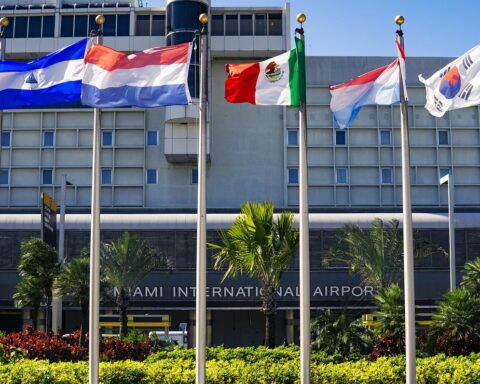A bill making its way through the Alabama state legislature would allow airports throughout the state to create public-private partnerships to help with operations or construction projects.
Authored by Rep. Chip Brown, HB 87 sailed through the Alabama state house with only two votes in opposition. The bill must now get through the Senate, where it is expected to pass before landing on Gov. Kay Ivey’s desk for final approval.

“We are seeking to give airport authorities more flexibility to enter into public-private partnerships that they can’t currently do, ” Brown said in an interview with Government Market News. “This will allow them a wider array of development opportunities and more flexibility for projects moving forward.”
Alabama has 73 airports that create around 30,000 jobs throughout the state. But the airports are in desperate need of investment. In total, airports in Alabama are holding $117 million in debt and need $1.3 billion to upgrade infrastructure, according to a 2023 report from Airports Council International.
By allowing the airports to enter into public-private partnerships, also known as P3 agreements, Brown said the airports will have more flexibility. Instead of the airports having to bear the costs alone, private companies can share in the cost and potential profits resulting from upgrades.

Under current Alabama law, airports can enter agreements with private companies such as a restaurant or an airline, but they cannot form new entities to co-own and manage projects together. The airports are owned by public entities, and private companies can contract with the airports.
If the bill passes, private companies in Alabama will have the opportunity to take on a share of ownership in airports. Brown said this would help move infrastructure projects along more quickly. For example, airports could offset the cost of building a new parking facility by entering a partnership with a company that would fund a portion of the upfront construction cost in exchange for a share of the profits from parking fees for a set number of years, Brown said.
“This will allow for more growth opportunities and economic development opportunities to expand things like hangar space and infrastructure improvements,” Brown said. “It will allow [airports] to offset costs.”
Being able to share costs would allow airports to pursue more projects simultaneously. More than 5 million people call Alabama home, up at least 5.1% since 2010, according to the U.S. Census Bureau. With a growing population, Brown said it is important for the state’s airports to have as much flexibility as possible to pursue projects that will improve the experience of travelers to and from the state.
Public-private partnerships are not new, and several airports across the U.S. already have similar agreements with private companies. In 2019, Los Angeles International Airport entered a 30-year $4.9 billion P3 agreement for the construction of its automated train system. In New Mexico, the Clovis Regional Airport used a public-private partnership to build a water pipeline to bring the airport onto the same water system as the rest of the city.
Not every P3 agreement has panned out. In 2017, the Denver International Airport needed to expand its main terminal, and it went to a P3 model. The project, however, went over budget and eventually the P3 agreement was scrapped. Denver is still working on the upgrades expected to be complete in 2028.
The problems in Denver were a result of lack of budget transparency and flawed management, not the P3 model, according to a 2023 report from the Bipartisan Policy Center.
“P3s can help local governments reduce their exposure to risk of projects going over budget and alleviate some of the burden of design, development, and long-term management of airports,” the report said.
If signed by Gov. Ivey, the bill will take effect Oct. 1, 2024. Alabama’s airports and companies are already in the planning stages for airport infrastructure projects, anticipating that the bill will become law, Brown said.
All news and information on this site is provided by the team at Strategic Partnerships, Inc. Check out this short 1-minute video that provides a quick overview of how we work with clients.












